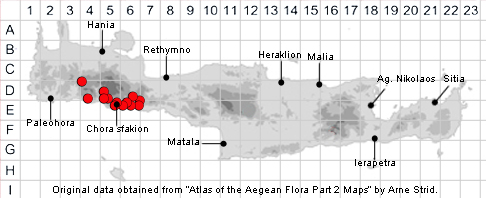SPECIES DESCRIPTION
SANGUISORBA CRETICA
Family and Genus:- See- ROSACEAE/Subgen. POTERIUM
Common Names:- None
Homotypic Synonyms:- Poterium sphacioticum
Meaning:- Sanguisorba (L) Blood-stauncher, reference to its styptic property.
Cretica (L) Cretan, from Crete.
General description:- Woody-based perennial forming ± pendent clumps
with many persistent dead leaves.
Stems:-
1) Flowering, erect, slightly exceeding the basal leaves, sparingly branched; leafy,
rarely leafless.
Leaves:-
1) Glaucous, with c. 6 pairs of orbicular to elliptical leaflets;
2) Basal, numerous, long-petiolate, imparipinnate, dark glaucous-green.
3) Cauline, reduced.
4) Leaflets, 2-5 pairs, usually 12-20 mm, shortly petiolulate, broadly ovate to
suborbicular, distinctly and evenly dentate-serrate with 8-14 teeth on either side.
Flower:-
1) Flowering heads, few, globose, c. 15 mm in diam.
a) lower flowers, hermaphrodite.
b) upper, female.
2) Sepals, greenish.
3) Fruiting hypanthium, c. 3.5 mm, ellipsoid, 4-angled, with longitudinal ridges.
Fruit:-
1) Achenes,1(-2) enclosed in the 4-angled hypanthium, which becomes dry and
hard.
Key features:-
1) Leaves, dark glaucous-green, with c. 6 pairs of larger leaflets 2·5-3 cm.
2) Capitula, globose.
3) Hypanthium, broadly winged, with longitudinal ridges on the faces.
Habitat:- Shady, vertical or overhanging limestone cliffs in gorges. 50-400(-1100) m.
Distribution:- Endemic to gorges on the southern side of western Crete, mostly in
the eparhia of Sfakii.
Flowering time:- Mid-Mar to May
Photos by:- Fotis Samaritakis

